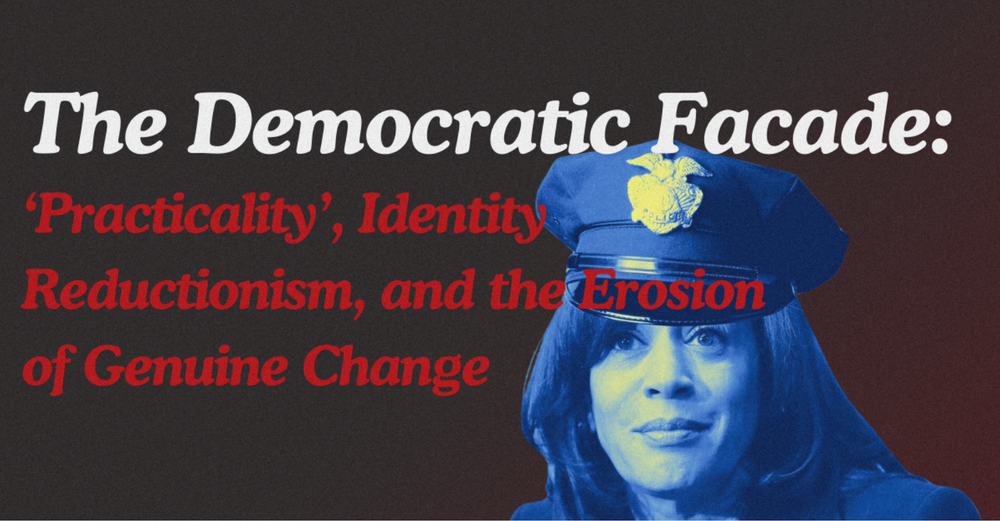The U.S. political system, particularly during election seasons, is often portrayed as a robust and vibrant democracy where citizens exercise their power through voting. However, beneath this facade lies a deeper narrative of complacency, apathy, and complicity that serves to maintain the status quo. The rhetoric of “practicality,” and the manipulation of identity politics reveal how the democratic process has been co-opted to stifle genuine efforts for systemic change. These dynamics contribute to the erosion of true democratic engagement and reinforce oppressive structures, particularly in the context of global struggles and the perpetuation of colonial systems.
The Rhetoric of ‘Practicality’ and Its Role in Maintaining the Status Quo
“Sometimes people hold a core belief that is very strong. When they are presented with evidence that works against that belief, the new evidence cannot be accepted. It would create a feeling that is extremely uncomfortable, called cognitive dissonance. And because it is so important to protect the core belief, they will rationalize, ignore and even deny anything that doesn’t fit in with the core belief.” – Frantz Fanon, (Black Skin, White Masks)
The rhetoric of “practicality,” often wielded by careerist liberals who position themselves as the “online left,” plays a significant role in maintaining the U.S. political status quo. Proponents argue that seeking alternatives to the existing system is a wasted endeavor. This argument, presented as pragmatic realism, urges the masses to focus on immediate, attainable goals rather than what are dismissed as “utopian” aspirations of overturning the system.
This so-called ‘practicality’ is a facade. Vice President and current Democratic Party nominee for president, Kamala Harris’ statement in her CNN interview with Dana Bash, ‘My values have not changed,’ perfectly captures the Democratic Party’s performative commitment to progressive policies while simultaneously aligning with ‘crime and punishment’ neocons and war hawks. Harris is adopting a more hawkish immigration policy as Donald Trump’s campaign pours millions into border attacks, and she has even expressed interest in appointing a Republican to her Cabinet if elected, mirroring Barack Obama’s practice of nominating Republicans to his administration.
Both major parties are deeply entrenched in systems that perpetuate war, economic inequality, and environmental destruction. By discouraging alternatives, mocking radical change as impractical, and fearmongering about the viability of ‘revolution’, they effectively narrow the scope of possibilities. This leaves little room for voices that challenge the status quo. The illusion of choice within this duopoly reduces political discourse to a binary, silencing those who seek systemic change and reinforcing the very systems that drive global conflict and inequality.
The almost flippant dismissal of radical alternatives under the guise of practicality is not merely about winning elections; it is about maintaining the existing power structures that benefit from the duopoly. Both major parties are heavily influenced by corporate interests and are often aligned on key issues such as military intervention, deregulation, and the preservation of capitalist structures. This results in a political landscape where genuine alternatives are marginalized, and the electorate is presented with a false dichotomy: vote for one of the two major parties or risk being labeled as naive or irresponsible.
This narrative is intended to stifle debate and reduce political engagement to a binary choice. It not only discourages people from engaging in direct action or other forms of democratic participation that challenge the status quo but also perpetuates a political culture of complacency, where short-term electoral gains are prioritized over long-term systemic change.
This facade of practicality is particularly exposed in the context of the “lesser evil” argument, which becomes untenable when both major parties endorse or perpetuate policies that contribute to genocide and necropolitics. This dichotomy fails to account for the fact that both major parties often support or enable genocidal actions and the systemic devaluation of lives in colonized communities in the U.S. and the global south. By framing any challenge to this binary as impractical, proponents of the status quo reveal their complicity in maintaining systems that prioritize power and profit over peoples- centered human rights and even democracy.
In this way, the disingenuousness of “practicality” becomes a demobilization tool, discouraging people from organizing for a different kind of politics. It fosters a political culture of complacency, where the focus is on short-term electoral gains rather than long-term systemic change. By framing radical movements as impractical, the rhetoric of practicality ultimately serves to maintain a political landscape hostile to genuine change.
The Impact of Identity Reductionism and ‘Strategic Anti-Racism’ on Anti-Colonial Struggle
Similarly, the manipulation of identity politics by the Democratic Party and its allies serves as another form of control, reducing complex struggles for justice to mere tokens of representation. This reduction not only limits meaningful debate but also constrains the broader discourse on identity and systemic change. The political landscape’s false dichotomies, which reduce complex social issues to simplistic electoral choices, mirror the phenomena to dilute the rich, historical struggles of colonized communities into identity reductionism.
As previously noted, identity reductionism, unlike genuine identity politics, simplifies and commodifies identity, reducing it to a set of superficial characteristics rather than recognizing it as rooted in deep historical and material conditions. For instance, in many political campaigns, a candidate’s identity—be it their race, gender, or sexuality—is often highlighted to appeal to specific demographics.
However, this focus is frequently devoid of a commitment to addressing the systemic injustices those identities face. The result is a tokenistic approach that pays lip service to diversity while maintaining the very power structures that identity politics seeks to dismantle. In this context, identity is stripped of its material and historical significance and repurposed as a tool for power consolidation (for the ruling class), rather than as a means to challenge the structures that perpetuate inequality and injustice.
This approach conditions the masses to support systems of oppression as long as they are presented with a veneer of progressivism. When those in power share a superficial identity marker with the oppressed, their policies—no matter how reactionary or harmful—are often seen as legitimate. We are asked to put aside The Biden-Harris administration’s ongoing unwavering support for Israel, despite its ongoing genocidal actions against Palestinians because Kamala Harris, an African/Black woman, is the Democratic Party presidential nominee. This dynamic is counterrevolutionary, further exposing the contradictions inherent in the radical liberalism of the past decade.
Currently, identity reductionism and “strategic anti-racism”—using anti-racism rhetoric or calling out anti-Blackness not as a genuine effort to dismantle all forms of oppression, but as a way to deflect from broader, interconnected struggles—are working together to significantly impede the formation of a united, anti-colonial movement. Identity is weaponized to distract from the broader goal of dismantling colonial systems, focusing attention on inter- group conflicts rather than on the structures of oppression and the primary contradiction of imperialism. These approaches serve to demobilize and fragment the collective struggle against colonialism and imperialism by obscuring the material conditions that unite oppressed peoples and redirecting focus toward divisive and superficial markers of identity.
What is to be done?
The rhetoric of ‘practicality’ and the reliance of identity reductionism— paired with “strategic racism” — create a culture of complacency, apathy, and complicity, stifling genuine efforts for systemic change. These tactics serve as tools of control, narrowing the scope of political debate and confining democratic participation to a binary that ultimately upholds the status quo. To break free from this trap the notion of incremental change within these oppressive systems is the only way forward must be rejected. Radical possibilities that challenge the underlying structures of colonialism, capitalism and imperialism must be embraced.
What is needed is a united, anti-colonial movement that prioritizes the liberation of all oppressed peoples. This means moving beyond the limitations imposed by the duopoly and mainstream politics and building coalitions grounded in solidarity and self- determination. By centering the struggles of the colonized and refusing to compromise on people-centered human rights, the masses can begin to cultivate a democratic society that is not only practical but essential for true justice and liberation. The time to act is now, and it begins by rejecting false pragmatists and committing to a just future.
Organize.
Re-published with the permission of Hood Communist

